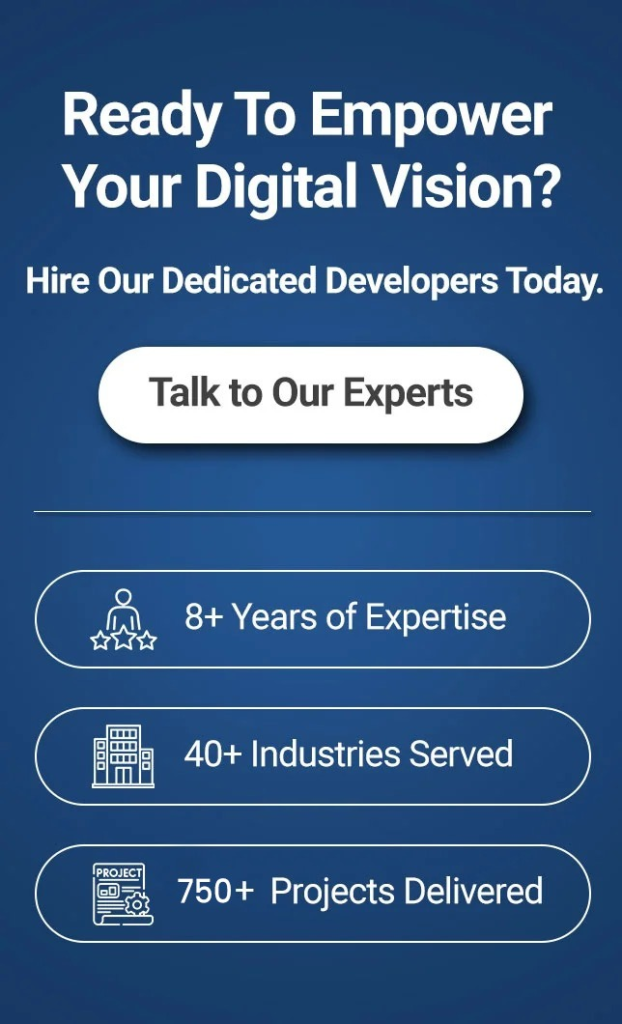It’s 2025!
Even today, developers often run into the debate between Python vs. PHP for web development.
But if you’ve landed right here, you’re too worried about choosing the best between Python vs. PHP for web development!
Don’t sweat it! After reading the post, you don’t have to go anywhere on the internet!
In this blog post, we’ll discuss;
- What is Python?
- Explain the features & benefits of Python.
- PHP: What is it?
- Features & Benefits of PHP
- Difference Between Python & PHP
It is no secret that both languages are designed for web development, but each has its traits. If you want to choose one for your web project, understanding them in detail is important!
To understand what’s best for your web project, let’s dive in!
Understanding Python
Python is a high-level, programming and scripting language that is known for building high-quality and robust web apps for different business verticals. Fortified with simplicity, readability, and an ecosystem of libraries, the language is widely used for project development among startups and full-fledged businesses. Its popularity in today’s world lies in its modular architecture and simple syntax.
Furthermore, Python is beneficial in abundant applications, including scientific computing, web development, data analysis, artificial intelligence, machine learning, and more. Whether you want to build server-side scripting or web app development, Python leverages robust frameworks like Django, Flask, and Pyramid.
Speaking of its design mechanism, the programming language uses indentation and dynamic semantics and primarily focuses on code readability. Moreover, its major highlight is that it supports programming standards, such as object-oriented programming, structured (mainly procedural), and functional.
Features & Benefits of Python

Let’s take a look at the quick features and benefits of Python for web development.
- Easy to Code
Though it is a high-level programming language, it is relatively easier than its counterparts. Whether you have technical knowledge or not, anyone can learn to code in 2-3 days and implement it. But if you want to master its advanced modules and concepts, then it’s viable to spend some time. So, even without prior knowledge, Python is easier to learn.
- Free and Open-Source
Another major benefit of Python is that it’s free and open-source. Thus, it means that it is completely free to use even for building commercial web apps. Since it’s developed under an open-source license, you don’t need to spend to download it via its official website. Developers can easily modify and re-distribute it. If you don’t know how to use it, know the tips to hire a web development company and make a lucrative choice.
- Supports Object & Procedure-Oriented
One of the notable Python features is that it provides extensive support for both object-oriented and procedure-oriented programming. Remember that both these standards make Python a versatile programming language of all time. The former focuses on design around data and objects while the latter emphasizes functions wherein code can easily be reused.
- Portable
Another major feature and benefit of Python is its portability. If you already own codes for an operating system like Windows and you want to run it across other OS, then it’s seamlessly possible. With Python, developers don’t need to change the code. Instead, they can use the same code for different OS like Unix, Mac, & Linux.
- Pre-Defined Variable
When building a web application, you’re not required to specify the variable type like int, char, long, or double. That’s the beauty of Python! Instead, it is pre-decided during the run time. If you don’t need to decide the variable at the start, it would make the programming simpler and better.
Now, that you might have understood Python, it’s time to know about PHP to learn the difference between PHP & Python.
PHP: What is It?
PHP (Hypertext Preprocessor) is another popular programming language that’s being used for building dynamic and interactive websites and web apps. Speaking of PHP web development‘s popularity, nearly 80% of websites use PHP which includes WordPress.com, Facebook.com, Zoom.us, Canva.com, Wikipedia.org, and Microsoft.com. In addition to websites and apps, the programming language helps build RESTful APIs, SOAP web services, and data processing and visualization. Moreover, developers can easily integrate it with DBMS and web services.
Features and Benefits of PHP

Let’s take a quick look at the features and benefits of PHP.
- Cross-Platform Compatibility
One of the key features of PHP is that it performs well across all kinds of OS. These include Windows, Mac, Linux, and Unix. Furthermore, it supports all devices, including laptops, smartphones, desktops, and tablets. No matter whatever website or web app you build using PHP, it works across all OS & devices.
- Flexible
Another major benefit of PHP is that it offers unmatched flexibility and embedding options that enable dynamic content generation based on various conditions and inputs. Furthermore, it can easily be integrated with JavaScript, HTML, XML, etc.
- Prevent Errors
One of the major features and benefits of PHP is that it supports predefined error-reporting constants to produce error warnings. Additionally, it simplifies exception handling to identify potential errors and then eliminate them.
- Super-fast Performance
Unlike other programming languages like Node Js or Python, PHP scripts can show better performance, thus making it a preferred choice among many developers. Backed by its data loading and database connectivity feature, PHP facilitates efficient database management and server administration.
- Object-Oriented features
Finally, PHP is infused with object-oriented features that facilitate quick website loading. Thus, it offers a seamless browsing experience to the users. Furthermore, it offers additional features including data encapsulation, inheritance, and more.
Comparison Between PHP & Python Based on Real-Time Parameters
Though both PHP and Python are incredibly popular for web development, choosing one is important. Here is a quick comparison table to learn the difference between PHP and Python.
| Parameters | PHP | Python |
| Learning Curve | PHP is easier to learn as compared to Python, which makes it easier for developers to understand and implement the code. | Python, on the other hand, is an ideal option for long-term projects. |
| Type of Applications | PHP is ideal for web development. Many developers are using the framework solely for web development. | Python is an ideal choice for web development. In addition, developers can use it for Machine Learning, Artificial Intelligence, System Scripting, and more. |
| Frameworks | PHP has a large number of frameworks, which makes it an ideal choice for developers. | Python, on the flip side, has the least number of frameworks, including Django and Flask. |
| Performance | When it comes to Python vs PHP performance, PHP stands tall. | On the contrary, Python is less fast. It is also popular for building web apps, though. |
| Maintenance | If you want to maintain medium and large-scale projects, then PHP is not easy to maintain. | However, projects built using Python are easier to maintain. |
| Popular Users | Some of the notable users of PHP may include Facebook, WordPress, Wikipedia, & Yahoo | On the other hand, popular users of Python include Instagram, YouTube, Pinterest, Quora, Uber, Spotify, and Dropbox |
Final Thoughts
So, that’s all about the difference between PHP and Python!
Remember that building a performance-centric website or web app is important for a business’s success. No matter what framework you choose, focus on building an app that solves customer’s pain points. Furthermore, it will help enhance user engagement.
Don’t have time to work on your web development project? If so, leave everything to EitBiz! As a leading PHP/Python web development service provider, we help maximize your reach and engagement with scalable web application development.
Let’s build a new website or web app today! Drop us an email at info@eitbiz.com or call us at +1 (812) 530- 6300 today!
Author
-

EitBiz is a fast-growing and dynamic software, mobile app and web design and development company, expanding to multiple countries.
View all posts


![Laravel Development: Cost Breakdown, Essential Tools & FAQs [2025 Guide]](https://www.eitbiz.com/blog/wp-content/uploads/2025/04/Laravel-Development-1024x536.jpg)



